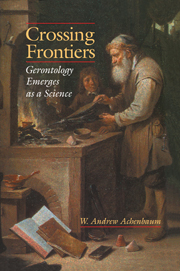Book contents
- Frontmatter
- Contents
- Acknowledgments
- Abbreviations
- Introduction
- Part I Old age becomes a “problem” worth investigating scientifically
- 1 Surveying the frontiers of aging
- 2 Setting boundaries for disciplined discoveries
- 3 Establishing outposts for multidisciplinary research on aging
- Part II Gerontology takes shape in the era of Big Science
- Conclusion
- Index
3 - Establishing outposts for multidisciplinary research on aging
Published online by Cambridge University Press: 26 March 2010
- Frontmatter
- Contents
- Acknowledgments
- Abbreviations
- Introduction
- Part I Old age becomes a “problem” worth investigating scientifically
- 1 Surveying the frontiers of aging
- 2 Setting boundaries for disciplined discoveries
- 3 Establishing outposts for multidisciplinary research on aging
- Part II Gerontology takes shape in the era of Big Science
- Conclusion
- Index
Summary
Reflecting onThe Way of the Investigator, Walter Bradford Cannon identified certain intellectual qualities and technical competencies that every medical researcher should possess. “The investigator in biological science should have, besides a knowledge of electrical apparatus and its uses, a good grounding in other aspects of physics and also chemistry.” In addition to this, complex statistical methods were “a valuable adjunct to the biologist's mental equipment” in order to measure phenomena as accurately as possible. Cannon felt that “serendipity” made multidisciplinary approaches efficatious in the biological and physical sciences. Solutions to “urgent, difficult and apparently baffling social problems are likely to be made by minds characterized by learning and liberality,” the Harvard physiologist, who was one of gerontology's architects, noted. “Quite unforeseen possibilities will unexpectedly spring forth.”
Cannon's own career as a researcher, teacher, and philosopher of science attests to the importance of intellectual curiosity, dedication and “unforeseen possibilities” in the life of an investigator. Family friends and neighbors in St. Paul, Minnesota, made it financially possible for Cannon to attend Harvard; he graduated summa cum laude in 1896. Upon receiving his M.D. four years later, he was appointed an instructor of physiology at Harvard Medical School; from 1906 until his retirement in 1942, he served as George Higginson Professor of Physiology. Cannon presented his first research papers while in medical school: Using primitive X-ray equipment, he was the first person to study the motor activity of the alimentary tract uncomplicated by anesthesia.
- Type
- Chapter
- Information
- Crossing FrontiersGerontology Emerges as a Science, pp. 85 - 118Publisher: Cambridge University PressPrint publication year: 1995



